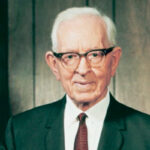
How Has the LDS Interpretation of the Word of Wisdom Changed Over Time?
Hey guys, so we’re talking about the Word of Wisdom today. If you don’t know what that is, go watch these episodes. In a nutshell, it’s a Latter-day Saint health code revealed to Joseph Smith in 1833 — it’s the reason why we don’t chew or smoke tobacco or drink alcohol, tea, or coffee. Latter-day Saints today adhere to a rather strict interpretation of the Word of Wisdom, but it wasn’t always that way. In this episode, we’re going to look at how our interpretation of the Word of Wisdom has evolved over time. It’s fascinating stuff — don’t go anywhere.
Alright, so if you’re familiar with the text of D&C 89, you’re aware that the Word of Wisdom was not given “by commandment or constraint.” In these early years, it was essentially considered good advice, and the emphasis was more on moderation rather than total abstinence.
Today, however, Latter-day Saints completely abstain from the substances referred to in the Word of Wisdom. So, why do we interpret this so strictly today when they didn’t back then? Well, our modern interpretation of the Word of Wisdom is not the result of some grand revelation but has been more of a slow burn, having more to do with slowly evolving attitudes and circumstances. Now, that’s not to say that God hasn’t been inspiring this gradual shift. It’s simply been more comparable to a gradual sunrise rather than flipping on a light switch.
And that’s OK. I love belonging to a faith that can be flexible and adapt to changing circumstances over time. And there could be more changes in the future. But in the early years of the Restoration, it was largely up to each individual to decide how strictly to observe the Word of Wisdom. As long as you avoided excess and weren’t out drunk on the street, you probably weren’t going to get in any trouble.
To read the entire article: Saints Unscripted/Faith&Beliefs









